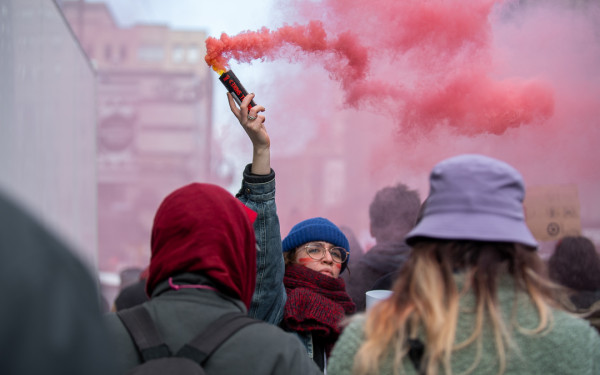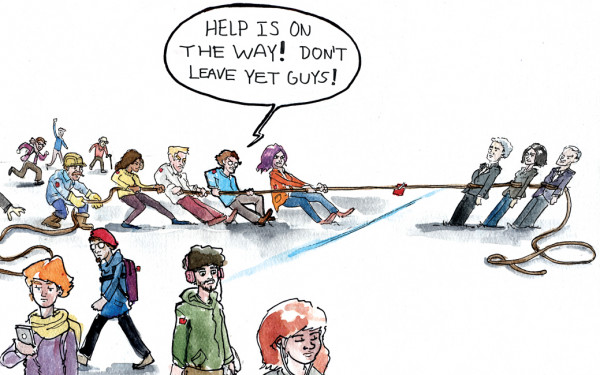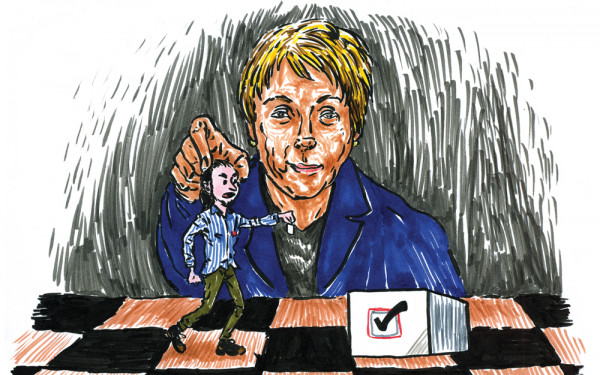Maple Spring 2.0?
Indexation Seems Less Likely to Trigger Province-Wide Unrest, But Questions Remain
It’s that time of year again, and the question is looming.
Is Quebec about to witness Round Two of what is now referred to as “the strike” or the Maple Spring—a series of student protests that made headlines worldwide, and quite literally rocked the province?
At first glance, the ingredients for another set of massive demonstrations appear to be present.
Quebec Premier Pauline Marois’s recent announcement of her government’s intention to index tuition fees to the cost of living has visibly provoked anger and discontent amongst students.
Last year, Marois sported the red square of the student movement for a couple of months during the lead-up to the September general elections, receiving an extra boost by way of student campaigns opposing the Quebec Liberal Party.
Now, some students have voiced feelings of betrayal as a result of the plans for indexation—and “Parti Québécois, Parti Bourgeois” chants are increasingly shouted at demonstrations.
Last year’s fight against the $1,625 hike proved students right—contestation, apparently, works.
The past two weeks have seen large turnouts at multiple demonstrations, most coming to a close with clashes between protesters and police, just like last spring.
This week is set see two major demonstrations, likely to materialize in a similar fashion. But a closer look at the details of the current situation suggests that things are very different today than they were a year ago.
Not Again—For Now
The Fédération étudiante universitaire du Québec and the Fédération étudiante collégiale du Québec, which combined represent approximately 205,000 students, or almost 75 per cent of Quebec’s post-secondary students, have already announced that going on strike isn’t an option they plan on entertaining in the near future.
Last year’s student strike was not a phenomenon that happened on a whim; it was the result of a campaign led by student associations that began in the spring of 2011, when then-premier Jean Charest first announced the hike in tuition fees.
“When you go on strike, there’s nothing more you can do to put pressure on the government,” said Martine Desjardins, president of the FEUQ.
“There are other ways to pressure them before we ask [students] to make the ultimate sacrifice—going on strike.”
FECQ president Éliane Laberge echoed the sentiment that a strike isn’t an option yet, and that there are many steps to go through beforehand, namely consulting member associations.
All three of the province’s major student federations, the Association pour une solidarité syndicale étudiante, FEUQ and FECQ will be holding a congress for their respective members in the coming weeks.
An Exhausting Strike
The strike was undoubtedly exhausting for all involved.
It was physically strenuous, encompassing hundreds of demonstrations lasting anywhere from two to eight hours, often ending in violent police interventions.
As a philosophy professor at the Collège de Maisonneuve, Julien Villeneuve witnessed the impact the strike had on students firsthand.
Villeneuve is a member of Les Profs contre la hausse, an organization of post-secondary professors in Quebec who stood in opposition to the Liberals’ tuition hike.
“Obviously, there was a certain fatigue. On the other hand, students were extremely motivated to come back to class—there hadn’t been class for a while,” he recalled, adding that violence was not uncommon at demonstrations.
“Most students who were very mobilized suffered from violence or insults by policemen, or saw their friends suffer from it,” Villeneuve said. “Sometimes, it’s harder to see somebody we love being beaten than to be beaten ourselves.”
On top of the daily wear and tear of the strikes, some students’ educations were impacted, as their studies were compressed into shortened semesters to compensate for the lost classes.
“In a lot of cases, we were trying to [teach] twice the class materials in half the time—it wasn’t easy,” admitted Villeneuve.
The impact of the strikes was also financially trying. The uncertainty of the strike’s outcome and its length prevented many students from earning the money they needed to afford both their education and basic needs; a fund was even set up at the Université du Québec à Montréal for a student food bank.
Most striking students did, however, resume their studies.
“We were surprised to see that at the college level, the drop-out rate wasn’t drastically higher than for a regular session,” said Laberge.
“Those who voted for a strike were aware of the impact that it had on their lives.”
2_900_598_90.jpg)
The Not-So-Disastrous Summit
Despite the indexation, both the FEUQ and FECQ have been vocal about the fact that the provincial Summit on Higher Education did yield important results.
“Of course we’re facing an indexation, we’re very disappointed about that,” said Desjardins. “But at the same time, we won several victories for the students.”
Laberge went as far as to consider some of the summit’s victories to be historic.
“For example, the major improvements in financial aid that we’ve been asking for for years,” pointed out Laberge, though adding that she still is disappointed by the indexation.
The summit also resulted in the creation of a council of universities, something student associations had been asking for, and will now have the opportunity to take part in.
Fondation 1625 on Alert
Strike or not, the Fondation 1625, a non-profit association created by Université Laval student Laurent Proulx dedicated to fighting legal battles during the strike, is ready.
“If there is some general strike and if some students need help because access to their courses is blocked, for sure Fondation 1625 will help them,” said Miguaël Bergeron a member of the foundation.
“These are not the most costly affairs; you don’t need a lawyer to have an injunction to attend your courses,” he said.
The Fondation 1625 recently sent out letters to several universities and CEGEPs, stating that if they don’t respect their obligations toward students, the Fondation 1625 “will put all the resources it has toward students who want their rights to be enforced.”
Additionally, the letters state that the foundation will “encourage [students] to sue for contempt anybody who obstructs a possible court decision.”
Since its creation last August, the Fondation’s PayPal account has received over $20,000 in donations to fight legal battles.
“We have a lot of support from students who basically had no one to defend them before,” he said.
“They were stuck between their university administrations, their teachers and their student associations who weren’t listening to them.”
To Be Continued…
While a new province-wide strike is unlikely, several demonstrations are already planned for the coming weeks.
Student associations are also taking part in working groups established after the summit.
But, according to professor Julien Villeneuve, remobilizing immediately isn’t necessarily the most important thing for students.
“My perspective is to admire [students] for what they achieved,” he said.
“Even if they can’t mobilize in the short-term with the same intensity they did before, they already did so much. They contributed so much to bring back the topic of free education in the public discourse—something nobody dared do before.”

_900_477_90.jpg)


_600_375_90_s_c1.jpg)


